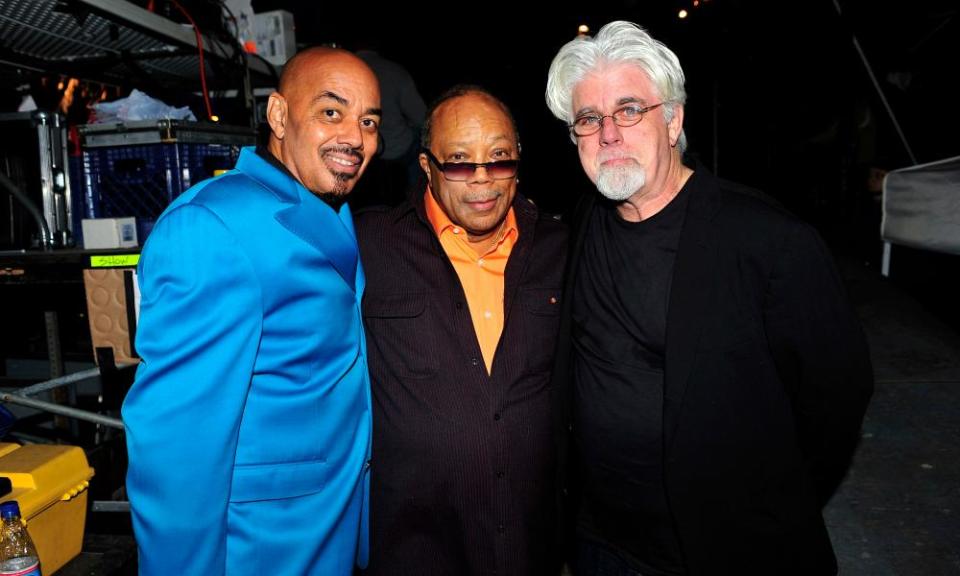James Ingram obituary

When he topped the US singles chart in 1990 with I Don’t Have the Heart, it was the first time James Ingram had scored a solo hit, even though he had already been heard on seven previous Top 40 singles recorded in collaboration with other artists. Ingram, who has died aged 66, was gifted with a fluid, supple voice with an undertone of appealing huskiness.
He scored his earliest major successes in collaboration with the producer Quincy Jones, with whom he recorded the Top 20 singles Just Once and One Hundred Ways. “I thought, ‘If Quincy Jones thinks I can sing, then I guess I must be able to sing’,” he said. One Hundred Ways earned him his first Grammy award, and he would earn a second for Yah Mo B There, his 1983 duet with Michael McDonald. He received a total of 14 Grammy nominations.
His duet with Linda Ronstadt on Somewhere Out There, from the animated film An American Tail, reached No 2 in the US and No 8 in the UK in 1987 – his only British Top 10 appearance.
As a composer, Ingram co-wrote PYT (Pretty Young Thing) with Jones for Michael Jackson’s album Thriller (1982), and also wrote material for Ray Charles and the Pointer Sisters. He scored a brace of Oscar nominations for best original song, for his themes for the 1993 film Beethoven’s 2nd (The Day I Fall In Love, a duet with Dolly Parton) and the 1994 movie Junior (Look What Love Has Done, a duet with Anita Baker). He joined Jones, Jackson and numerous other stars for the charity single and video We Are the World (1985).

Ingram was born in Akron, Ohio, one of six children of Henry Ingram, a church deacon, and his wife, Alistine. His oldest brother was a gifted keyboard player and James wanted to follow suit, so as well as singing in the church choir he taught himself to play the piano. An early musical idol was the jazz organist Jimmy Smith, but since his parents could not afford to buy an organ, at the age of 14 James joined a local nightclub band playing instrumental jazz and pop covers. “These guys were good musicians and they had a real organ,” he recalled in 1999.
Though a promising enough athlete to be offered a track scholarship, he opted for music. At 18 he joined the Akron band Revelation Funk, among whose achievements was to play as opening act for the Ohio Players, and in 1973 travelled with them to Los Angeles in search of greater career opportunities.
Although they recorded the track Time Is on Our Side for the “blaxploitation” film Dolemite (1975), the band were not making ends meet. They returned to Ohio, but Ingram stayed in LA and, after working as a solo performer in R&B clubs, he was recruited to play keyboards and sing backing vocals for Ray Charles. He also performed in the Coasters’ backing band on Dick Clark’s oldies package tours, and worked as a demo singer for the ATV music publishing company, being paid $50 per song. Then he was hired as musical director for the soul singer Leon Haywood, and played on his single Don’t Push It Don’t Force It (1980).
Ingram received a career-changing boost when Jones, who had heard Ingram’s demo recording of the Barry Mann/Cynthia Weil song Just Once, picked Ingram to be one of the vocalists on his album The Dude (1981). Jones re-recorded Just Once with Ingram, and it reached No 17 on the Billboard Hot 100 singles chart (the song was featured in the film The Last American Virgin the following year).
Another track from The Dude sung by Ingram, One Hundred Ways, reached 14 on the US chart, and won Ingram the best male R&B vocal performance at the 1982 Grammys. Now signed to Jones’s Qwest record label, he reached 73 with his duet with Patti Austin on Baby, Come to Me, but it subsequently reached No 1 after being used in the TV soap General Hospital. In 1984 he was back in the US Top 20 with What About Me?, which he performed with Kenny Rogers and Kim Carnes.
His first solo album was It’s Your Night (1983), and he recorded a further four solo albums, the last of them being Stand (In the Light) (2008), but enjoyed the bulk of his success with his singles and soundtrack work. In the latter sphere, other notable achievements included co-writing Don’t Make Me No Never Mind with Jones and Roy Gaines for Steven Spielberg’s film The Color Purple (1985), and another duet with Baker on When You Love Someone, for Forget Paris (1995).
In later years, Ingram undertook regular international tours, finding particularly receptive audiences in the far east, and was happy to stick to his soul and R&B roots. “It was better music when I was coming up, with Motown and Stevie Wonder and all of that,” he said in 2010.
He is survived by his wife, Debbie, whom he married in 1975, and their six children.
• James Edward Ingram, singer, musician and songwriter, born 16 February 1952; died 29 January 2019

 Yahoo News
Yahoo News 
